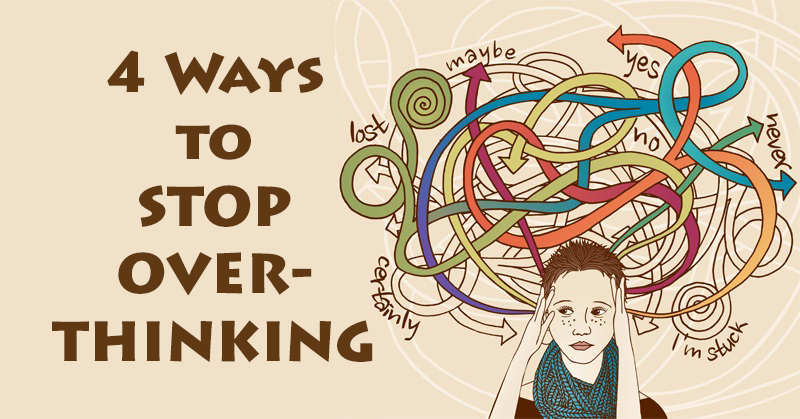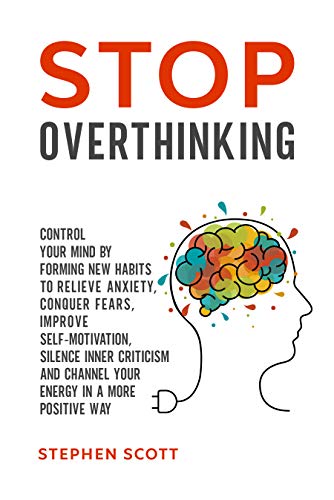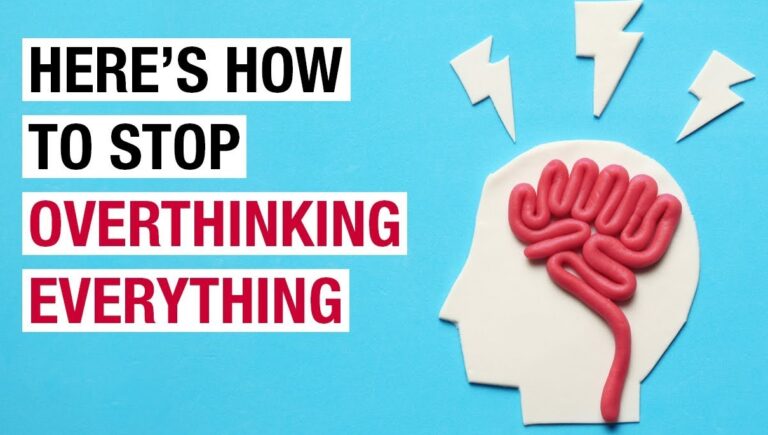Today in this post I will learn about How to stop overthinking and negative thoughts (Overthinking and Negative Thoughts and it’s 7 Effective Strategies) to Put an End to Them.
Dealing with overthinking and negative thoughts can be a challenging task, but it’s crucial for maintaining mental well-being. Constantly dwelling on negative scenarios and replaying them in your mind can lead to increased stress, anxiety, and even depression.
👉 50 day thoughts/motivation to start your day in Hindi
How to stop overthinking and negative thoughts
In this article, we will explore seven practical strategies to help you break free from the cycle of overthinking and negative thought patterns.

1. Recognize the Pattern:
The first step in conquering overthinking is to recognize when it’s happening. Often, negative thoughts can become automatic, leaving you unaware of the impact they have on your mental health. Mindfulness is key here – practice observing your thoughts without judgment. By identifying the patterns, you can start to regain control.
👉 Double Meaning Jokes In Hindi 699+ 😶🌫️😮🤪🫣🤭
2. Challenge Your Thoughts:
Once you’ve recognized the negative thought patterns, it’s time to challenge them. Ask yourself if the thoughts are based on facts or assumptions. Are there any alternative explanations for the situation? This process of cognitive restructuring can help you reframe negative thoughts into more balanced and realistic perspectives.
3. Practice Gratitude:
Focusing on what you’re thankful for can be a powerful antidote to overthinking and negativity. Incorporate a gratitude journal into your daily routine. Each day, write down a few things you’re grateful for. This practice can shift your focus away from negativity and promote a more positive outlook on life.
4. Engage in Positive Activities:

Idle minds are often more susceptible to overthinking. Fill your schedule with activities that bring you joy and satisfaction. Engaging in hobbies, exercise, spending time with loved ones, or pursuing creative endeavors can redirect your thoughts towards positive experiences.
👉 My Reason To Die | Choosing Life Suicide
5. Embrace Mindfulness and Meditation:
Mindfulness techniques and meditation can help you stay grounded in the present moment. By practicing deep breathing and guided meditation, you can quiet the chatter of your mind and reduce the grip of overthinking. Regular mindfulness practice can lead to increased self-awareness and emotional regulation.
6. Set Realistic Goals:
Setting overly ambitious goals can lead to constant worrying about the future. Instead, establish realistic goals and break them down into smaller, manageable steps. This approach allows you to focus on achievable tasks rather than getting lost in overthinking about the distant outcome.
7. Seek Professional Help:
If overthinking and negative thoughts are significantly impacting your daily life, it’s essential to seek help from a mental health professional. Therapists and counselors can provide personalized strategies to address your specific challenges. Cognitive Behavioral Therapy (CBT), for instance, is highly effective in managing overthinking and changing negative thought patterns.
👉 how to partition local disk c in windows 11 without losing data (3 Method)
Tricks to stop overthinking

Here are 7 succinct tricks to stop overthinking:
- Practice Mindfulness: Stay present, focus on now.
- Set Time Limits: Dedicate time for thinking, move on after.
- Challenge Thoughts: Question negativity, seek balance.
- Physical Activity: Exercise releases overthinking grip.
- Engage Hobbies: Dive into tasks that demand focus.
- Deep Breaths: Calm your mind, find clarity.
- Positive Distraction: Redirect thoughts to enjoyable tasks.
How to stop overthinking anxiety

Stopping overthinking and managing anxiety go hand in hand. Here’s a concise guide on how to tackle overthinking related to anxiety:
- Identify Triggers: Recognize what triggers your overthinking and anxiety.
- Mindfulness Techniques: Practice deep breathing and grounding exercises.
- Set Worry Time: Dedicate a specific time each day for worries.
- Challenge Negative Thoughts: Question the validity of your anxious thoughts.
- Stay Active: Engage in regular physical activity to reduce anxiety.
- Seek Support: Talk to a friend, family member, or therapist.
- Limit Caffeine and Alcohol: Reduce substances that can exacerbate anxiety.
These steps might require time and effort, but gradually incorporating them into your routine can help you manage overthinking and anxiety more effectively.
👉 “Unveiling the Dynamics of Girl and Girl Relationships: Insights, Challenges, and Empowerment”
How to stop overthinking relationships

Putting an end to overthinking in relationships can greatly improve your emotional well-being. Here’s a brief guide on how to achieve that:
- Open Communication: Discuss your concerns with your partner openly and honestly.
- Set Boundaries: Establish healthy boundaries to prevent overthinking triggers.
- Trust Your Partner: Give them the benefit of the doubt and trust their intentions.
- Focus on Facts: Challenge assumptions and base thoughts on real evidence.
- Mindfulness: Stay present and avoid ruminating on hypothetical scenarios.
- Engage in Self-Care: Prioritize your well-being to reduce stress and anxiety.
- Distraction Techniques: Channel your energy into productive activities.
By practicing these strategies, you can break free from the cycle of overthinking and enjoy healthier, more fulfilling relationships.
How to stop overthinking about someone

Overthinking about someone can be emotionally taxing. To break free from this habit, try these concise strategies:
- Limit Contact: Reduce communication frequency to lessen triggers.
- Distract Your Mind: Engage in hobbies or activities that absorb your attention.
- Mindfulness Practice: Focus on the present moment to reduce rumination.
- Talk About It: Share your feelings with a friend for perspective.
- Challenge Assumptions: Question if your thoughts are based on facts or assumptions.
- Set Time Limits: Allocate specific time to think about the person, then move on.
- Self-Care: Prioritize your well-being with exercise, relaxation, and rest.
Over time, these tactics can help you regain control over your thoughts and free yourself from constant overthinking about someone.
👉 Best 21 questions for a new relationship with answer
How to stop overthinking the past

Letting go of overthinking about the past can be liberating. Here’s a concise guide to help you stop dwelling on past events:
- Practice Mindfulness: Focus on the present moment to redirect your thoughts.
- Accept Imperfection: Embrace that mistakes are part of being human.
- Learn from Lessons: Reflect on the past to gain insights for the future.
- Challenge Regrets: Question whether rehashing the past serves any purpose.
- Positive Self-Talk: Replace self-criticism with self-compassion.
- Engage in Present Activities: Stay active in tasks that demand your attention.
- Seek Closure: Address unresolved issues if possible, for emotional healing.
Breaking the cycle of overthinking the past takes practice and patience. By applying these techniques, you can gradually shift your focus toward the present and future, allowing yourself to move forward with a lighter heart.
How to stop overthinking what you said

Overthinking what you said in a conversation is common, but it’s important to manage this tendency. Here’s a concise guide to help you:
- Recognize Normalcy: Understand that everyone makes conversational slips.
- Practice Self-Compassion: Treat yourself kindly and don’t magnify mistakes.
- Reframe Negative Thoughts: Challenge negative interpretations of your words.
- Shift Focus: Engage in tasks that redirect your mind from replaying the conversation.
- Mindfulness Techniques: Use deep breathing to stay present and ease anxiety.
- Realize Importance: Most small talk errors have minimal impact on relationships.
- Learn and Move On: Use mistakes as learning experiences, then release them.
By applying these strategies, you can stop ruminating on past conversations and alleviate the stress that overthinking can bring.
👉 Top 10 Most Powerful Countries In The World In 2050
Why is it so hard to stop overthinking

Stopping overthinking can be challenging due to various psychological and cognitive factors. Here are a few reasons why it can be hard to break this habit:
- Cognitive Habits: Overthinking often becomes a deeply ingrained habit over time. Your brain gets used to following certain thought patterns, making it difficult to change the automatic response.
- Fear of Uncertainty: Overthinking can be a way to try to control uncertain situations. The human brain naturally seeks predictability and security, leading to a tendency to ruminate on different outcomes.
- Emotional Investment: If you’re emotionally invested in a situation or outcome, it’s natural to dwell on it extensively. Strong feelings can amplify overthinking.
- Perfectionism: Striving for perfection can lead to overthinking as you constantly analyze and evaluate your actions, trying to make everything flawless.
- Anxiety and Stress: Overthinking is often linked to anxiety and stress. These emotional states can exacerbate overthinking, creating a cycle that’s hard to break.
- Lack of Control: Overthinking can stem from a feeling of not having control over a situation. It’s an attempt to regain a sense of control by thinking things through repeatedly.
- Negative Bias: The brain has a negativity bias, which means it’s more likely to focus on potential threats or negative outcomes. This bias can feed into overthinking.
- Mind’s Default Mode: When you’re not focused on a specific task, your mind often defaults to wandering, which can lead to overthinking.
- Brain Chemistry: Neurotransmitters and brain structures can influence your propensity to overthink. Imbalances may contribute to the difficulty in stopping this behavior.
- Lack of Awareness: Sometimes, people may not even be fully aware they are overthinking, making it harder to address the issue.
Overcoming overthinking requires consistent effort, self-awareness, and a willingness to challenge your thought patterns. Techniques like mindfulness, cognitive restructuring, and seeking professional guidance can help you gradually reduce and manage overthinking tendencies. Remember that change takes time, so be patient with yourself during this process.
FAQs: How to Stop Overthinking and Negative Thoughts
1. What are some effective strategies to stop overthinking and negative thoughts?
Overthinking and negative thoughts can be managed through techniques like mindfulness, cognitive restructuring, and positive distraction.
2. How can mindfulness help in overcoming overthinking?
Mindfulness involves staying present and observing thoughts without judgment, which can break the cycle of overthinking and promote mental clarity.
3. What is cognitive restructuring and how does it work?
Cognitive restructuring involves challenging and replacing negative thoughts with more balanced perspectives, helping to reduce overthinking patterns.
4. How does engaging in positive distraction assist in stopping negative thoughts?
Engaging in enjoyable activities like hobbies or exercise redirects focus away from negative thoughts, aiding in breaking the cycle of overthinking.
5. Can practicing gratitude help counter negative thoughts?
Yes, keeping a gratitude journal and focusing on positive aspects of life can shift your mindset and diminish the influence of negative thoughts.
6. Are there professional interventions to tackle overthinking and negative thought patterns?
Yes, mental health professionals offer therapies like Cognitive Behavioral Therapy (CBT), which provide personalized strategies to combat overthinking and negative thinking.
7. How long does it take to see results from these strategies?
Results vary, but consistent practice of these techniques can lead to noticeable improvements in managing overthinking and negative thoughts over time.
8. What role does physical activity play in stopping overthinking and negative thoughts?
Engaging in regular physical activity releases endorphins, which can uplift mood and contribute to reducing overthinking and negative thought patterns.
9. How can I break free from the cycle of overthinking about past mistakes?
Techniques like self-compassion, learning from mistakes, and mindfulness can help redirect focus from past errors and promote self-growth.
10. Is seeking professional help advisable for severe overthinking and negative thoughts?
Absolutely. If overthinking and negative thoughts significantly impact daily life, consulting a mental health professional can provide tailored support and strategies for improvement.
Conclusion:
Overthinking and negative thoughts can hinder your well-being and prevent you from enjoying the present moment. By recognizing the patterns, challenging your thoughts, practicing gratitude, engaging in positive activities, embracing mindfulness, setting realistic goals, and seeking professional help when needed, you can regain control over your thoughts and cultivate a more positive mindset.
If you enjoyed this post, or if you learned something new, please share it with your friends and followers on social media. You can share it on WhatsApp, Facebook, Instagram, Telegram, Pinterest, Twitter, Google NEWS, Google+, and other social media sites. You can also subscribe to my YouTube channel.

